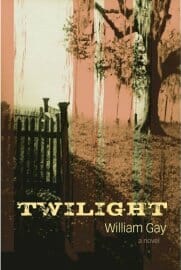
William Gay — Twilight
Prose master weaves chilling tale about an undertaker not doing his job
William Gay’s dark new novel, Twilight, will likely divide readers into two camps—those who love the Southern Gothic element and those who don’t.
The story is death-drenched, the characters hardly seem to belong to the last century, the language is torqued with rhetorical flourishes, and the plot is packed full of cruel and gruesome events that feel as if an entire culture were emptying the repressed contents of its gloomy psyche into the world. I found myself alternating between both camps, loving and resisting the book, reading it first as a brilliant fable, then as a nightmare, but also picking up a vibe that seemed to bring the novel very close to parody, a story mocking its own methods. Kenneth and Corrie Tyler discover that the undertaker in town, Fenton Breece, hasn’t properly buried their father, nor anyone else for that matter, filling the caskets with trash, leaving the dead undressed, removing their genitals. Kenneth steals Fenton’s briefcase and discovers a packet of pictures—corpses arranged in sexual poses, some of which include “Breece himself, nude and gross and grinning, capering gleefully among the painted dead.” Breece hires Granville Sutter, a known murderer and the embodiment of unreasoning evil, to get the pictures back.
The prose in Twilight makes extensive use of the Latinate so that as we move through this rustic, backwoods locale we get a world that is “malefic” and “implacable,” we get “stygian trees,” and things are “telluric” and “revenantial.” While this language elevates and dignifies the struggles of the overlooked, it also hits the page somewhat self-consciously, marking the novel’s terrain as “literary.” It argues the case for a certain worthiness, but, perhaps, after Faulkner and McCarthy, that worthiness isn’t quite so much in doubt, and as a result the heightened rhetorical language of Twilight might, to some readers, feel overly insistent.
But there are really two languages in this book, the soaring prose that drives the narrative and belongs to the writer, and then the colloquial words that come to us in dialogue and belong to the characters. It’s this dialogue that really brings the characters to life. Unlike the narrative prose, which takes on the heroic task of trying to name things in this dark universe, the characters, as they speak to one another, are sly and oblique, unwilling to state anything directly. The resulting deadpan humor is marvelous, the dialogue keen and bleakly funny.
Despite my reservations about the intermittently juiced rhetoric, Twilight is full of beautiful prose. Gay nails the best description ever of an old car’s oxidized paint: “It had been black but was a black now that remembered nothing of paint and seemed to draw light and suck it out of sight somewhere beneath its surface.” When Gay settles into the simpler and more natural iambic rhythms of English, he writes great stuff: “He put the lid on the bucket and tapped it home with a fist and laid the brush neatly atop it and walked off rapidly toward the walnut grove.” That’s a smartly observed sentence written by a man who has done some painting in his life.
Kenneth Tyler sets off across a ruined wilderness called the Harrikin, hoping to find an outside world where law and human justice are still possible. But once he enters the wilderness he realizes it’s “more of a maze than ever.” Lost, he meets the forsaken inhabitants of a land that has swallowed up nearly all traces of human endeavor. There is Hollis Bookbinder, an old man who might give himself over to nostalgia if the past would yield it—but it does not. Tyler encounters a witch who wants to tell his fortune. “There was more wickedness in the world than you thought and you’ve stirred it up and got it on you, ain’t ye?” Each of these remnant, traditional figures seems to be functioning in a broken allegory, a destroyed fable, unable to help Tyler any more than the law he desperately seeks.
Characters reel rapidly through the novel, appearing and disappearing. In this past-haunted world, people aren’t inclined to look back; personal history doesn’t offer up much insight or guidance.
There is also a compelling absence of psychological depth in these characters. Of Granville Sutter, we know only that, in hunting down Tyler, “something in his life that had been without form was taking shape.” That “something” will live in the world, not as thought or understanding, but as action—violent action.
This absence of a soothing depth—of motive, reasons, understanding—is one of the great achievements of the novel. It sets up a central tension for the reader, who desires to know more, while the writer resolutely adheres to the truth of his universe—that such comforts aren’t available and that the quiverings of the individual consciousness aren’t substantial enough in the face of life’s darkly malevolent forces. In that sense, this excellent novel of a vanished world is as modern as they come, speaking to all of us. [Note: William Gay is a Paste contributor.]